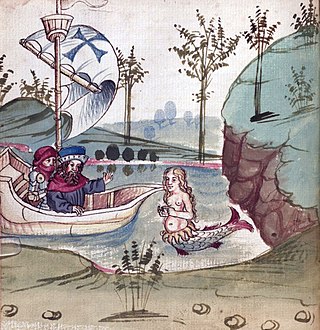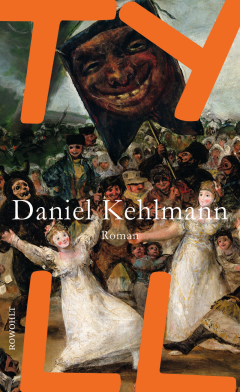This article presents lists of literary events and publications in the 16th century.

Till Eulenspiegel is the protagonist of a European narrative tradition. A German chapbook published around 1510 is the oldest known extant publication about the folk hero, but a background in earlier Middle Low German folklore is likely. The character may have been based on a historical person.

Sebastian Brant was a German humanist and satirist. He is best known for his satire Das Narrenschiff.

Chełm is a city in southeastern Poland with 60,231 inhabitants as of December 2021. It is located to the south-east of Lublin, north of Zamość and south of Biała Podlaska, some 25 kilometres from the border with Ukraine. Chełm used to be the capital of the Chełm Voivodeship until it became part of the Lublin Voivodeship in 1999.

Georg Faustus (sometimes also Georg Sebellicus Faustus , known in English as John Faustus, was a German itinerant alchemist, astrologer, and magician of the German Renaissance. He was often called a conman and a heretic by the people of medieval Europe.

Wise Men of Gotham is the early name given to the people of the village of Gotham, Nottinghamshire, in allusion to an incident where they supposedly feigned idiocy to avoid a Royal visit.

Walter Trier was a Czech-German illustrator, best known for his work for the children's books of Erich Kästner and the covers of the magazine Lilliput.

Solomon and Marcolf is a medieval narrative describing the adventures and conversations of Solomon and Marcolf, or Marolf. The adventures have some connection with those of Ashmedai, while the conversations consist chiefly of riddles similar to those put to Solomon by the Queen of Sheba. The exact extent of its indebtedness to the Haggadah is somewhat doubtful, though it is practically certain that the various versions are derived from an Eastern original.
In folklore, a simpleton is a person whose foolish actions are the subject of often-repeated stories. Simpletons are also known as noodles or fools. Folklore often holds, with no basis in fact, that certain towns or countries are thought to be home to large numbers of simpletons. The ancient Greeks told tales of stupid populations in Abdera and other cities; in Germany, men of Schilda are conspicuous in these stories; in Spain hundreds of jokes exist about the supposed foolishness of the people from Lepe; and in England, the village of Gotham in Nottinghamshire is reputed to be populated by simpletons. In Sri Lanka whole districts in the central, southern, and western provinces are credited with being the abode of foolish people.

Julius von Voss, also Julius von Voß was a German writer.

Elizabeth Shaw was an Irish artist, illustrator and children's book author, active in Germany.

The fool is a stock character in creative works and folklore. There are several distinct, although overlapping, categories of fool: simpleton fool, wise fool, and serendipitous fool.
Hermann Bote was a Middle Low German author and chronicler.
Philipp Frankfurter was a writer from Vienna. He collected the humorous tales surrounding the "Priest from Kahlenberg", published with a frame story in verse form as Des pfaffen geschicht und histori vom Kalenberg. It was printed as early as 1472 or 1480 in Augsburg. The "Priest from Kahlenberg" is a folkloristic trickster or prankster figure. A 1490 edition was printed by Heinrich Knoblochtzer in Heidelberg.
Solomon or Salomon Trismosin was a legendary Renaissance alchemist, claimed possessor of the philosopher's stone and teacher of Paracelsus. He is best known as the author of the alchemical works Splendor Solis and Aureum Vellus.

Michiel Hillen van Hoochstraten or Michel Hillenius, was a Flemish printer, publisher, bookseller and bookbinder. His printing press put out publications in a wide range of genres, including imperial ordinances, almanacs, devotional literature, anthologies of customs, textbooks, etc. He also printed humanistic writings by Erasmus, Adrianus Barlandus and Jacobus Latomus as well as the first Dutch-language version of the story of Till Eulenspiegel. His multiple editions of the Bible in Dutch translation were among the first to be published. Michiel Hillen van Hoochstraten is regarded as the most important publisher active in Antwerp in the first half of the sixteenth century.

Tyll is a 2017 novel, originally written in German, by the Austrian-German writer Daniel Kehlmann. The book is based, in part, on the folkloristic tales about Till Eulenspiegel, a jester who was the subject of a chapbook in 16th century Germany, as well as on the history of the Thirty Years' War. The book was first published in October 2017 in the original German by Rowohlt Verlag. An English translation by Ross Benjamin was published in the United States by Pantheon Books, a division of Penguin Random House, New York, in February 2020. Between its initial publication in 2017, and its publication in English, Tyll had sold almost 600,000 copies in Germany.

The Wise Men of Chelm are foolish Jewish residents of the Polish city of Chełm, a butt of Jewish jokes, similar to other towns of fools: the English Wise Men of Gotham, German Schildbürger, Greek residents of Abdera, or Finnish residents of the fictional town of Hymylä. Since at least 14th century Chełm had a considerable population of Jews.

A town of fools is the base of a number of joke cycles found in various cultures. Jokes of these cycles poke fun at the stupidity of the inhabitants of a real or fictional populated place. In English folklore the best known butt of jokes of this type are the Wise Men of Gotham. A number of works of satire are set in a town of fools.
The Fools of Chelm and Their History is a humorous book by Isaac Bashevis Singer about a fictional town of Chelm inhabited by naive Wise Men of Chelm.













